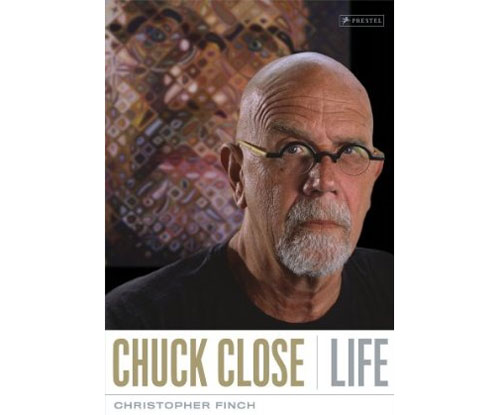Review: Chuck Close - Life by Christopher Finch

There is a divide between photography and, well, I suppose we might want to call it image making. Many photographers spend quite a bit of time explaining that their work still is photography even though it violates photographic orthodoxy. At least for a while, Chuck Close seems to have found himself on the other side of that divide, “risking” to be seen as crossing over into photography. It’s all about perception, of course. The divide is fairly useless unless you’re a lazy critic or an academic whose thinking has become as tenured as the career: Permanently stuck in a comfortable position. (more)
It is here, right at the divide, where things get truly interesting: images might change quality depending on how you look at them, and they evoke conflicting feelings and thoughts. I’ve long been an admirer of Chuck Close’s work simply for that reason: His work moves me, in more ways than just one. It is as much about what images tell us as it is about how they are made.
There is another reason why I’ve been admiring Close: He will literally do anything to make his vision come to life, regardless of whether that entails spending insane amounts of time on utterly tedious work or struggling with the limitations of his own body to be able to create work (or both, as has been his modus operandi ever since he suffered from a spinal stroke).
Christopher Finch’s Chuck Close: Life is new a biography that illuminates the artist behind the work, and it is a tremendous, albeit very slightly flawed read. Finch and Close have been friends for a long time, and the trust between the biographer and his subject clearly helped to shine a light on many aspects of the artist’s life. I does, however, at times also turn the book a bit into hagiography, where the lack of critical distance between two friends makes the author heap just a tad too much praise on his subject.
Seen as a whole, the reader will probably be able to ignore the hagiographical bits easily, especially since the book is so finely researched and well written. It also does what many such biographies unfortunately rarely do: It presents images right in the context of the text that discusses them. I’ve never been a big fan of biographies that have one or two sets of glossy pages with photos somewhere in between all the other pages, so you end up scrambling to find the image you’ve just read about. Chuck Close: Life lets you easily see what it is talking about.
As an introduction to the life of an artist, I can only recommend Chuck Close: Life. It is well written, never boring (I’ll admit that the childhood chapters in many biographies usually bore me to tears), and as up-to-date as it could be - if I remember correctly, the last events mentioned in the book date from last year.
Chuck Close: Life, by Christopher Finch, with many colour and b/w illustrations, 352 pages, Prestel USA, 2010